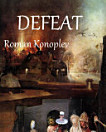The Precipice
Kuhusu kitabu pepe hiki
At the heart of the narrative is a love triangle involving Vera, Mark Volokhov, a radical and skeptical intellectual devoted to revolutionary ideas, and Raisky, an artistic and romantic figure who embodies sensitivity, creativity, and an almost naïve devotion to beauty. Vera's choices reflect the larger tension between tradition and change, faith and doubt, passion and rationality. Her determination to shape her own destiny in a world that seeks to confine women's roles gives the novel a strong psychological dimension.
The "precipice" of the title functions both as a literal place — associated with danger and dramatic moments — and as a metaphor for the fragile boundaries between conviction and chaos, freedom and destruction. Through richly drawn characters and their conflicting worldviews, Goncharov portrays a society standing at the edge of transformation, questioning established moral codes while grappling with the costs of progress and personal freedom.
Ivan Goncharov (1812–1891) was a Russian novelist best known for his sharp depictions of everyday life and the philosophical dilemmas of his time. Alongside A Common Story and Oblomov, The Precipice completes his major contributions to Russian literature, cementing his reputation as a realist writer who captured both the intimate struggles of individuals and the broader currents of social change in 19th-century Russia.
Kuhusu mwandishi
Ivan Goncharov was a Russian novelist and civil servant, best known for his novel Oblomov (1859), a masterpiece of Russian literature that introduced one of the most enduring archetypes in world fiction: the indolent and passive hero. His works reflect the social, cultural, and psychological tensions of 19th-century Russia, combining realism, social critique, and psychological depth.
In addition to his career in public administration, Goncharov became a central figure in Russian literature through his novels. His first major work, A Common Story (1847), examined the conflict between romantic idealism and pragmatic reality in Russian society. However, it was with Oblomov that Goncharov achieved lasting fame. The novel's protagonist, Ilya Ilyich Oblomov, spends much of the story immobilized by indecision and lethargy, symbolizing a broader critique of Russian aristocracy and its resistance to social and political change.
The term "Oblomovism" entered Russian and international vocabulary as a synonym for inertia, passivity, and social stagnation, testifying to the cultural impact of his most famous character. Goncharov's works, characterized by psychological realism and detailed social observation, influenced later Russian writers and contributed to the global appreciation of 19th-century Russian literature.







